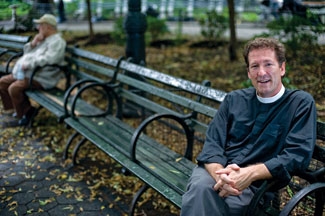 |
| Lyndon Harris, a pastor in New York, builds ‘Gardens of Forgiveness’ around the world to help promote the power of reconciliation. |
New York - Forgiveness didn't mean much to the Rev. Lyndon Harris on Sept. 11, 2001. He was too busy helping rescuers at the World Trade Center towers. He couldn't have known that one day he, too, would require rescue from his own ground zero.
After the twin towers fell, Father Harris spent the morning evacuating children from the nursery school at Trinity Church Wall Street – two blocks from the crash site. As he prayed and worked, he had no idea how dramatically his life would change.
All the children and their parents working nearby survived. For Harris the day went by in a blur. He spent most of it on the street, helping. The next morning, still dazed, he arrived at little St. Paul's Chapel, just up the street from Trinity. Ashes covered the cemetery out back, but the 200-year-old sanctuary where George Washington once worshiped was intact.
As the newly appointed priest in charge of St. Paul's, Harris made a decision. With his superiors at Trinity out of town, he spontaneously opened the chapel to the hundreds of workers at ground zero. For eight months, St. Paul's became a refuge to firefighters, workers, heavy-equipment operators, and police officers.
Open 24 hours a day, St. Paul's served more than a half million meals. Counselors, musicians, and an untold number of volunteers from around the world helped. The grimy faces and worn bodies of the workers showed the strain of their bleak work. But the smiles and uplifted waves to news cameras also revealed how profoundly touched these workers felt by the outpouring of love. Cards, letters, posters, quilts, and pictures hung from every fence, surface, pew, and wall of the "little chapel that stood."
Once emergency operations ceased, St. Paul's closed for inspection, and Harris faced the realities of life in a hierarchical organization. "The heights of joy I was blessed to share while serving others at St. Paul's Chapel were soon matched by the depths of my despair," he recalls. "Internal divisions concerning the direction of the ministries at St. Paul's boiled over. I wound up resigning."
Over the next three years, Harris's life spiraled down. His lungs had been compromised by exposure to the air at ground zero. He lost his house through foreclosure, and his marriage ended in divorce. "PTSD [post-traumatic stress disorder] and depression began taking over my life. I was bitter and resentful," he says.
At one point, a good friend listened to Harris's woes. But rather than commiserating, he threw down a challenge: What if you could forgive? Harris hung up the phone. But then he got to thinking: "Of course I had to forgive!" he says. "I'm a Christian pastor! It's part of my job description." He called his friend back and told him he'd give it a try.
That decision marked a turning point. Finally, Harris says, he could hear these words attributed to Nelson Mandela: "Not to forgive is like drinking a glass of poison and waiting for your enemies to die." Harris admits he drank deeply of that poison – mostly, he says, "because it tasted so good."
Out of the ashes of his despair, forgiveness began to bloom. He spent two years as a consultant to The Cathedral Church of Saint John the Divine (Episcopal) in New York City. As his health returned, he traveled to Beirut, Lebanon, to visit Alexandra Asseily. She had begun a movement to plant a Garden of Forgiveness in her beloved Lebanon after its civil war, which claimed more than 300,000 lives. The greatest gift to one's children, Ms. Asseily teaches, is to become a better ancestor. And that, she says, is done through forgiveness.
When he returned from Beirut, Harris joined with Dr. Fred Luskin of the Stanford Forgiveness Project to found their own nonprofit group: The Gardens of Forgiveness project. They want to fulfill Asseily's vision by planting gardens around the world. What better way to express life-affirming qualities of forgiveness than by cultivating living beauty in the earth?
Harris and Dr. Luskin also developed a forgiveness curriculum for middle-school students. Two New York City schools began teaching it four years ago, and more schools will soon come on board. The Gardens of Forgiveness project has planted gardens throughout New York State and in Chicago. The project also has partners in Durban and Soweto, South Africa; Uganda; and Liberia that are exploring planting Gardens of Forgiveness. Harris also dreams of a garden at ground zero in New York City one day, and one at Gettysburg, Pa., to help heal wounds that linger from the Civil War.
St. John's Lutheran Church in New York's West Village has asked him to become its full-time pastor. "They loved me back to church," Harris says. As part of an agreement between New York's Episcopal and Lutheran bishops, clergy between the two denominations may now serve in each other's parishes.
Most recently, Harris traveled to Rwanda, where he hopes to plant an extensive Garden of Forgiveness in memory of the almost 1 million Tutsis who died in the 1994 genocide there. As Harris's fellow activist, Rwandan musician Jean Paul Samputu, says: "Forgiveness is the most powerful unpopular weapon against violence that exists."
Adds landscape designer Julie Moir Messervy, who went with Harris to Rwanda: "Having learned about forgiveness himself, Lyndon goes into the world to make that emotional experience palpable to others. He sees that by creating a garden you can stroll through and experience with all your senses, you can make a path that leads toward forgiveness, toward transformation and a state of grace."
Page created on 9/9/2009 4:43:51 PM
Last edited 1/5/2017 7:03:16 PM
